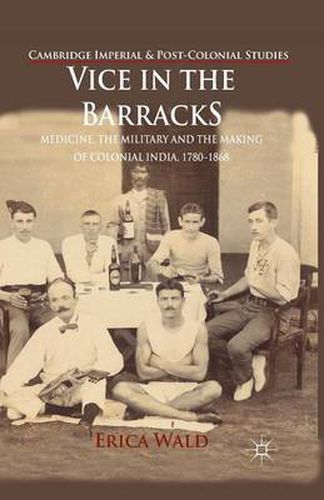Readings Newsletter
Become a Readings Member to make your shopping experience even easier.
Sign in or sign up for free!
You’re not far away from qualifying for FREE standard shipping within Australia
You’ve qualified for FREE standard shipping within Australia
The cart is loading…






This title is printed to order. This book may have been self-published. If so, we cannot guarantee the quality of the content. In the main most books will have gone through the editing process however some may not. We therefore suggest that you be aware of this before ordering this book. If in doubt check either the author or publisher’s details as we are unable to accept any returns unless they are faulty. Please contact us if you have any questions.
Shortlisted for the 2014 Royal Historical Society’s Gladstone Prize and the 2014 Templer Award for the Best First Book by a New Author. Sex and alcohol preoccupied European officers across India throughout the nineteenth century, with high rates of venereal disease and alcohol-related problems holding serious implications for the economic and military performance of the East India Company. These concerns revolved around the European soldiery in India - the costly, but often unruly, ‘thin white line’ of colonial rule. This book examines the colonial state’s approach to these vice-driven health risks. In doing so it throws new light on the emergence of social and imperial mindsets and on the empire, fuelled by fear of the lower orders, sexual deviation, disease and mutiny. An exploration of these mindsets reveals a lesser-explored fact of rule - the fractured nature of the Company state. Further, it shows how the measures employed by the state to deal with these vice-driven health problems had wide-ranging consequences not simply for the army itself but for India and the empire more broadly. By refocusing our attention on to the military core of the colonial state, Wald demonstrates the ways in which army decision-making stretched beyond the cantonment boundary to help define the state’s engagement with and understanding of Indian society.
$9.00 standard shipping within Australia
FREE standard shipping within Australia for orders over $100.00
Express & International shipping calculated at checkout
This title is printed to order. This book may have been self-published. If so, we cannot guarantee the quality of the content. In the main most books will have gone through the editing process however some may not. We therefore suggest that you be aware of this before ordering this book. If in doubt check either the author or publisher’s details as we are unable to accept any returns unless they are faulty. Please contact us if you have any questions.
Shortlisted for the 2014 Royal Historical Society’s Gladstone Prize and the 2014 Templer Award for the Best First Book by a New Author. Sex and alcohol preoccupied European officers across India throughout the nineteenth century, with high rates of venereal disease and alcohol-related problems holding serious implications for the economic and military performance of the East India Company. These concerns revolved around the European soldiery in India - the costly, but often unruly, ‘thin white line’ of colonial rule. This book examines the colonial state’s approach to these vice-driven health risks. In doing so it throws new light on the emergence of social and imperial mindsets and on the empire, fuelled by fear of the lower orders, sexual deviation, disease and mutiny. An exploration of these mindsets reveals a lesser-explored fact of rule - the fractured nature of the Company state. Further, it shows how the measures employed by the state to deal with these vice-driven health problems had wide-ranging consequences not simply for the army itself but for India and the empire more broadly. By refocusing our attention on to the military core of the colonial state, Wald demonstrates the ways in which army decision-making stretched beyond the cantonment boundary to help define the state’s engagement with and understanding of Indian society.